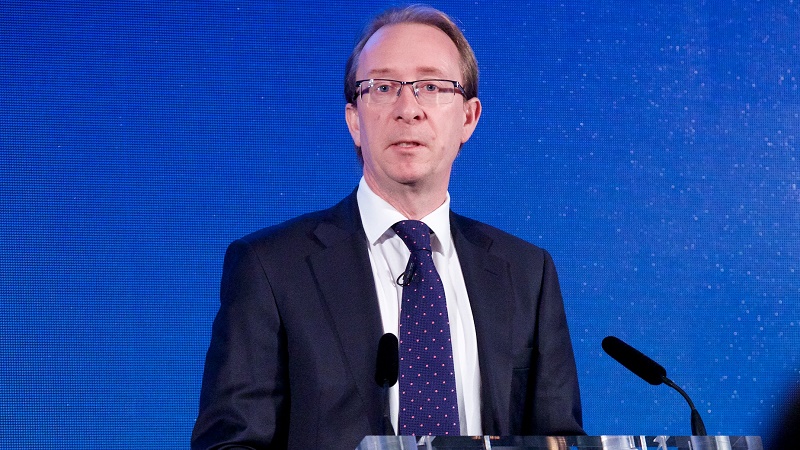M&G’s star bond manager Richard Woolnough (pictured) admits “it has not been a great year” for his £23bn Optimal Income fund as he takes a more bullish view than the market on the global recovery.
Speaking at the annual M&G Bond Vigilantes forum, Woolnough said his strong views on the longevity of the economic recovery, preference for short duration and decision to pile on lots of credit risk has made his mega fund “very volatile”.
He said there is currently a contradiction of views in the market, with many people believing that the historically wide corporate bond spreads of 2007 onward represent “the new normal”. Woolnough believes they will eventually fall back to 2004 to 2006 levels.
“It’s when the market agrees with us that we look like a very good asset manager and when the market decides recession is around the corner, we look like a poor asset manager,” he said.
Free money
Woolnough’s Optimal Income fund has its largest ever weighting to investment grade bonds, which now make up 60% of the portfolio. High yield by contrast only accounts for 13.3%, while government bonds make up 24.1% of the fund.
When his outlook is neutral, the portfolio is split into thirds across investment grade, high yield and government bonds/cash.
Woolnough said he has gravitated toward investment grade over high yield because he doesn’t think he is being paid enough to take on riskier assets.
Also, he said the recent flurry of M&A activity has led to a supply glut of BBB bonds making it easier for investors to buy in at more attractive levels.
“That’s the nearest you get to free money,” he said.
“We want corporate M&A to occur because as soon as that huge amount of supply comes, the bonds trade historically wide versus where they should, and it has nothing to do with cognitive default, nothing to do with liquidity, and all to do with supply.”
Sticking by short duration
He is also choosing to keep duration in the fund short. In October, duration was at 2.3 years, although this was up slightly from 2.2 years the previous month.
His other funds, M&G Strategic Corporate Bond and M&G Corporate Bond, have slightly higher duration at 4.96 years and 6.38 years, respectively, according to the funds’ October factsheets.
Hargreaves Lansdown head of investment analysis Richard Troue said relatively short duration in the funds has been the main driver behind Woolnough’s “weaker spell of performance”.
Interest rates have stayed lower for longer, meaning that longer-dated bonds have delivered stronger returns over shorter-dated instruments, said Troue in an investment note published last week.
While Woolnough’s mega bond fund has comfortably trounced rivals in the IA Sterling Strategic Bond sector over a decade, delivering 125% versus peers’ 84% return, he has taken flak for delivering middling to poor performance in recent years.
Over one and five years the fund is third quartile compared with peers in the sector. On a three-year view it has done slightly better, returning 10.9% versus the IA Sterling Strategic Bond sector’s 9.4%.
Even shorter-term, over three and six months, his fund is fourth quartile with returns flat at -2.3% over both periods.
But Troue said Woolnough’s short duration call has come in handy at times over the past year.
“Interest rates and bond yields have started to rise in the US, and bond prices have fallen as a result,” said Troue. “The fund hasn’t been immune, but it’s held up a little better when this has happened, most recently during September, although it underperformed over the year as a whole.”
Betting on a strong economy
Woolnough said the positioning of his bond portfolio is optically defensive. Far from preparing for a slowdown, he thinks rates will continue to go up, but that the economy will remain stronger for longer than the market anticipates.
He thinks inflation will continue to tick up in the US where he thinks the Federal Reserve has fallen behind the curve leading to “the hottest labour market you’ve had in 30 years”.
Though rising rates would push the US into slowdown territory toward the end of 2019, Woolnough expects tax cuts introduced by Donald Trump will extend the period of US growth into 2020.
Woolnough believes the UK will see its own bit of wage inflation due to Brexit-related labour shortages.
“I think whether it’s a hard Brexit, soft Brexit or no Brexit, it’s making it harder to recruit people into the UK and it’s going to put the price of UK labour up.”
He thinks this will be especially true if the European labour market improves. “If the European labour market is good, why come here?”
Troue said in his note that Woolnough “has a good track record of getting the bigger picture economic calls correct” but emphasised that “he doesn’t get it right every time”.
However, he added: “We think he’ll do a good job for long-term investors.”










